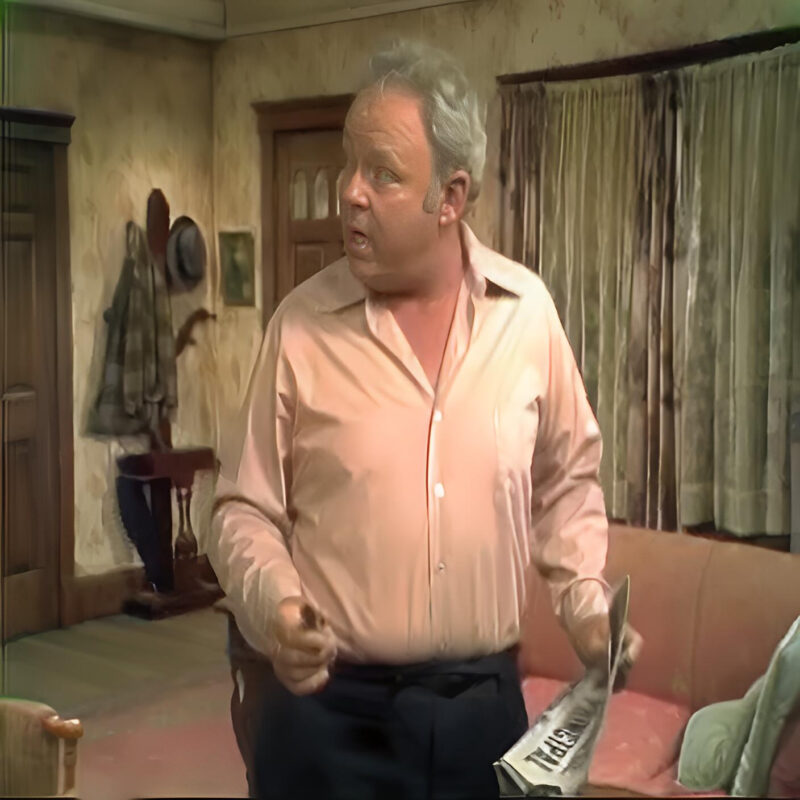
The acclaimed comedic writer and recent Kennedy Center Honors recipient, Norman Lear, reflects on his pioneering sitcom and the birth of political satire on primetime television.
Earlier this month, the Kennedy Center welcomed Norman Lear into its ranks (the celebration airs Dec. 26 on CBS). True to form, the spirited 95-year-old accepted the honor humbly but firmly refused to attend if President Trump was present. In the end, Trump stepped aside, allowing the honorees to enjoy their moment without political distraction.
Lear, modest yet resilient, has provided unparalleled creative integrity through his art, challenging societal norms and encouraging viewers to see the world differently. This is particularly evident in Lear’s defining sitcom, “All in the Family.”
Premiering on January 12, 1971, “All in the Family” was unlike any sitcom America had seen. Instead of the usual light-hearted hijinks, Lear navigated difficult subjects with biting dialogue and situational humor. The show, centered around a bigoted patriarch, Archie Bunker, blended politics, frailties, prejudices, and family dynamics, creating a unique form of political comedy.
Archie’s bigotry never prevailed; he always faced his comeuppance. However, it was the issues raised by Lear that sparked honest conversations and real emotions among viewers. Early episodes even featured a disclaimer, and CBS braced for a wave of angry callers who never materialized. The debates that ensued questioned whether the show condemned or glorified prejudice, but the complexity of its characters mirrored real life.
“All in the Family” showcased people as they are: flawed and complex. Archie’s actions stemmed from a fear of progress, while his family members also had their struggles. Edith, the heart of the Bunker household, represented the strength and optimism many aspired to.
Lear’s work achieved a rare level of perfection, and his recent Kennedy Center Honors recognition celebrates this legacy. In an interview with The Hollywood Reporter, Lear discussed politics, comedy, and more.
When asked about his bold stance on Trump attending the Kennedy Center Honors, Lear described himself as a “bleeding-heart conservative,” passionate about protecting constitutional rights while empathizing with those overlooked by society.
Lear recounted how he adapted the British show “Till Death Us Do Part” into “All in the Family.” Despite initial resistance, CBS eventually greenlit the show, leading to its groundbreaking success. Rob Reiner and Sally Struthers, who played Mike and Gloria, became integral to the show after several pilots.
Lear reflected on the show’s impact, noting that its humor transcended age demographics. He recounted a focus group experience where viewers laughed at Archie’s bigotry despite not wanting to admit it. This, Lear said, taught him everything he needed to know about audience reactions.
Despite the polarized political climate today, Lear believes “All in the Family” encouraged dialogue between opposing viewpoints. He shared his pride in episodes tackling difficult subjects, such as Edith losing and regaining her faith, and the impactful portrayal of her attempted rape.
Lear emphasized that Archie, despite his flaws, would never align with outright hate. While Lear suggested that viewers might never know if Archie would vote for Trump, the character’s complexity would leave it ambiguous.
Ultimately, Lear sees comedy as a powerful tool for reflection and connection. Laughter, he said, brings people together and creates a shared, uplifting experience. Watching audiences laugh, Lear concluded, is one of the most gratifying aspects of his work.
